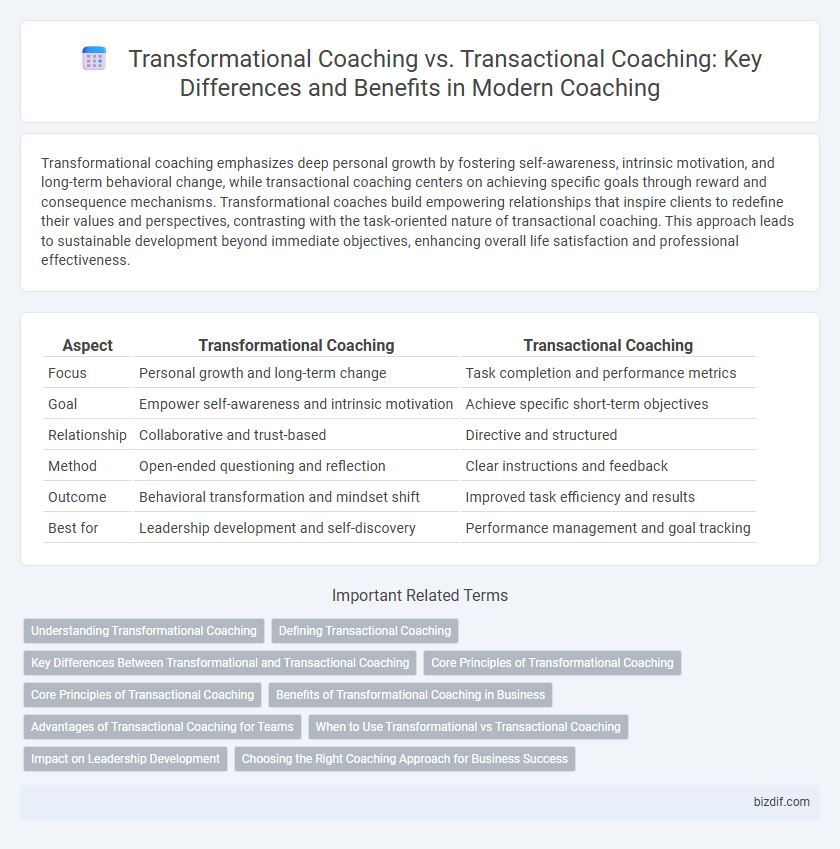Transformational coaching emphasizes deep personal growth by fostering self-awareness, intrinsic motivation, and long-term behavioral change, while transactional coaching centers on achieving specific goals through reward and consequence mechanisms. Transformational coaches build empowering relationships that inspire clients to redefine their values and perspectives, contrasting with the task-oriented nature of transactional coaching. This approach leads to sustainable development beyond immediate objectives, enhancing overall life satisfaction and professional effectiveness.
Table of Comparison
| Aspect | Transformational Coaching | Transactional Coaching |
|---|---|---|
| Focus | Personal growth and long-term change | Task completion and performance metrics |
| Goal | Empower self-awareness and intrinsic motivation | Achieve specific short-term objectives |
| Relationship | Collaborative and trust-based | Directive and structured |
| Method | Open-ended questioning and reflection | Clear instructions and feedback |
| Outcome | Behavioral transformation and mindset shift | Improved task efficiency and results |
| Best for | Leadership development and self-discovery | Performance management and goal tracking |
Understanding Transformational Coaching
Transformational coaching emphasizes deep personal growth by facilitating shifts in mindset, values, and self-awareness to achieve lasting change, unlike transactional coaching that centers on specific tasks and performance improvements. This method encourages clients to explore underlying beliefs and emotional patterns, fostering intrinsic motivation and empowerment. Effective transformational coaches use active listening, powerful questioning, and reflective techniques to guide clients toward profound behavioral and psychological transformation.
Defining Transactional Coaching
Transactional coaching centers on short-term performance goals through a structured, task-oriented approach, emphasizing specific outcomes and immediate feedback. This method relies on clear exchanges between coach and client, such as setting targets, monitoring progress, and reinforcing behaviors via rewards or corrective measures. The focus remains on enhancing efficiency and achieving measurable results within defined parameters.
Key Differences Between Transformational and Transactional Coaching
Transformational coaching focuses on deep personal growth and lasting behavioral change by addressing underlying beliefs and values, while transactional coaching centers on specific tasks, goals, and performance improvements through structured feedback and rewards. Transformational coaching facilitates self-awareness, emotional intelligence, and intrinsic motivation, whereas transactional coaching relies on external motivation and short-term objectives. Understanding these key differences enables coaches to tailor their approach to clients' developmental needs and desired outcomes.
Core Principles of Transformational Coaching
Transformational coaching centers on fostering deep personal growth by aligning clients' values, beliefs, and purpose to inspire lasting change and elevated self-awareness. It emphasizes holistic development through introspection, emotional intelligence, and mindset shifts, contrasting with transactional coaching's focus on performance and goal completion. Core principles include empowering autonomy, facilitating self-discovery, and nurturing intrinsic motivation for sustainable transformation.
Core Principles of Transactional Coaching
Transactional coaching centers on goal-setting, performance measurement, and structured feedback to drive immediate improvements and task completion. It relies on clear agreements between coach and coachee, emphasizing reward and recognition linked to specific outcomes. The core principles include accountability, consistency, and a results-oriented approach that prioritizes efficiency and clarity in progress tracking.
Benefits of Transformational Coaching in Business
Transformational coaching enhances business performance by fostering deep self-awareness and empowering leaders to adopt innovative strategies that drive long-term growth. It cultivates emotional intelligence and resilience, enabling teams to navigate complex challenges with agility and collaboration. This coaching approach results in sustained cultural change, higher employee engagement, and improved organizational adaptability in dynamic markets.
Advantages of Transactional Coaching for Teams
Transactional coaching enhances team performance by establishing clear goals, structured feedback, and measurable outcomes, which promote accountability and efficiency. This coaching style fosters consistency in task completion and aligns individual contributions with organizational objectives, leading to improved productivity. Teams benefit from transactional coaching as it creates a transparent framework for performance evaluation and skill development.
When to Use Transformational vs Transactional Coaching
Transformational coaching is most effective when fostering deep personal growth, mindset shifts, and long-term behavioral change in clients seeking profound development. Transactional coaching suits situations requiring specific skill enhancement, task completion, or performance improvement with clear, measurable goals. Choosing between the two depends on whether the focus is on evolving identity and values (transformational) or achieving immediate, tangible outcomes (transactional).
Impact on Leadership Development
Transformational coaching fosters profound leadership development by encouraging self-awareness, emotional intelligence, and visionary thinking, enabling leaders to inspire and motivate teams effectively. Transactional coaching centers on performance management and goal setting, driving immediate results through structured feedback and accountability. Leaders shaped by transformational coaching tend to exhibit greater adaptability and long-term influence, whereas transactional coaching enhances task execution and operational efficiency.
Choosing the Right Coaching Approach for Business Success
Transformational coaching fosters deep personal growth and long-term behavioral change, ideal for leaders aiming to inspire innovation and drive cultural shifts within organizations. Transactional coaching emphasizes goal-oriented tasks and immediate performance improvement, making it effective for meeting specific business objectives and enhancing skills quickly. Selecting the right coaching approach depends on whether the business prioritizes sustainable development and leadership transformation or rapid, measurable outcomes in performance.
Transformational Coaching vs Transactional Coaching Infographic

 bizdif.com
bizdif.com